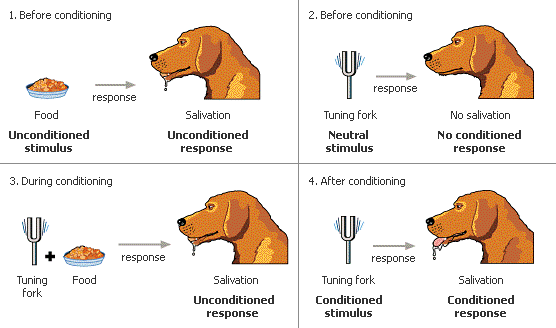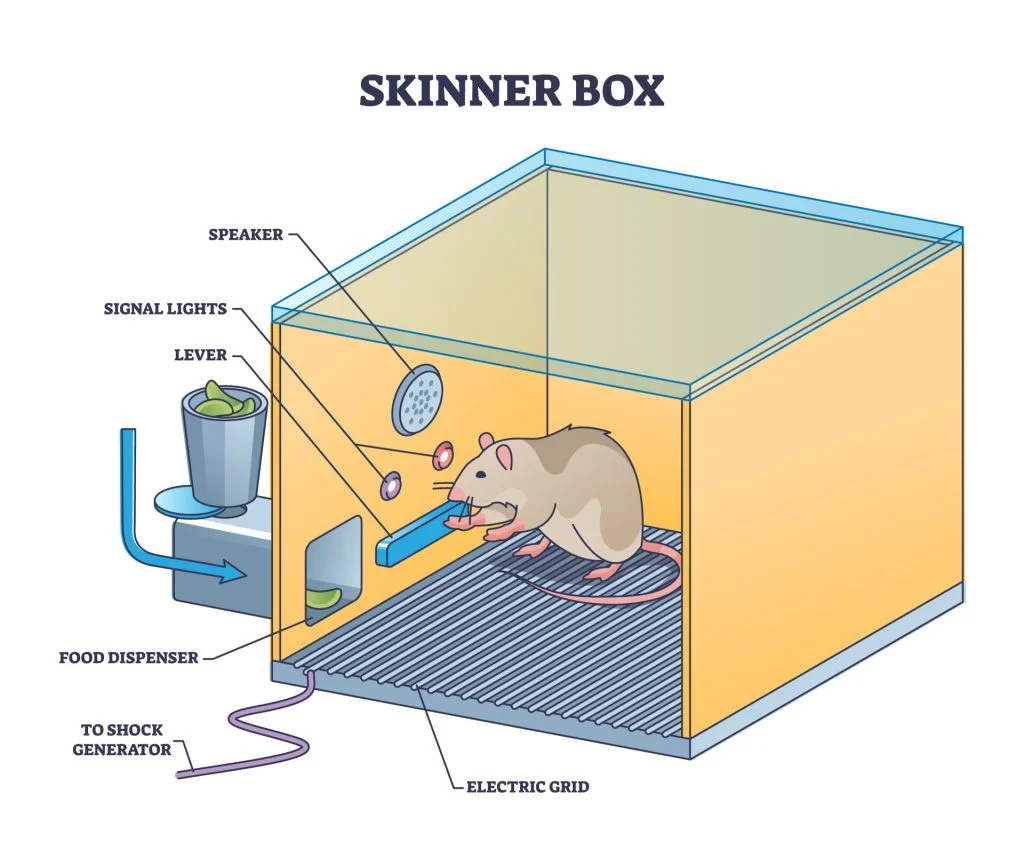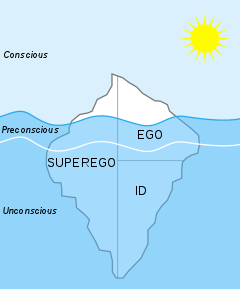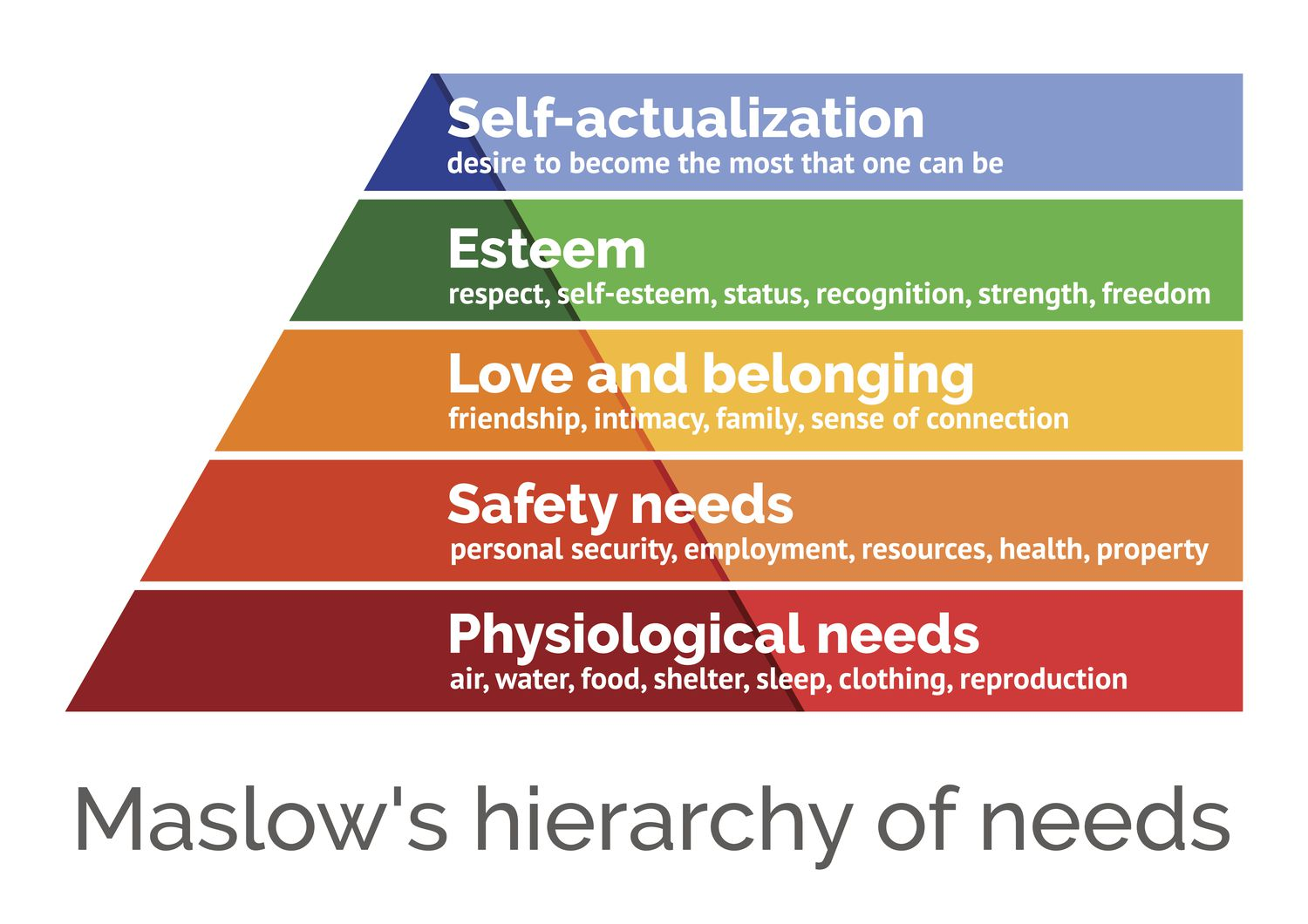Approaches
Origins of Psychology
- Wilhelm Wundt set up the first psychology lab in Leipzig in 1875
- Focused on aspects of the mind that could be observed and measured in controlled conditions
- Used introspection- studying the functions of the mind by asking people to describe their own thoughts, feelings and experiences
- First person to suggest the mind could be studied empirically using experiments
- Introspection was criticised for being subjective
- Watson began the behaviourist movement, studying observable stimulus-response behaviour
- Aimed to be more subjective
Behaviourist Approach
- Learning approach
- Emphasises the role of the environment and experience in learning behaviours
- Only considers observable behaviour and uses methods like lab experiments to gain control of variables and look for cause and effect relationships
- Highly objective
- Uses animal research as humans and animals learn by the same mechanisms
Classical Conditioning
Learning by association
First investigated by Pavlov
If a stimulus is paired multiple times with an existing stimulus-response, an association is made between the two stimuli
Stimulus generalisation- found that other stimuli similar to the conditioned stimulus also lead to the conditioned response
Stimulus discrimination- if many different neutral stimuli are presented but only one is paired with the unconditioned stimulus, only one stimulus will become conditioned
Temporal contiguity- unconditioned stimulus and neutral stimulus have to be paired at the same time

- Unconditioned stimulus = unconditioned response
- Neutral stimulus = no response
- Unconditioned stimulus + neutral stimulus = unconditioned response
- Conditioned stimulus = conditioned response
:) Used in developing treatments for mental illnesses such as systematic desensitisation to treat phobias, which has been found to be very effective
:) Very scientific- use of lab experiments and scientific method increases reliability and internal validity
:( Overly reductionist as it explains behaviour in terms of stimulus and response, ignores roles of mental processes and biological factors
:( Uses animal research- may lack generalisability, risk of ethical issues
:( Environmental determinism
Operant Conditioning
Learning by consequences
First investigated by Skinner
Positive reinforcement- positive consequence to the action
Negative reinforcement- removal of something unpleasant as a positive consequence to the action
Punishment- negative consequence to the action

Rats placed in a cage where food would only be delivered if they pressed a lever
Rats quickly learned to press the lever and would continue until they were full
Variation where the box gave the rats electric shocks until they pressed a lever
- Quickly learned to press the lever again
:) Used for token economies, which have been shown to be effective in treating behaviours like aggression in prisons
:( 69% DNA shared between humans and rats- cannot extrapolate, hard to generalise results
:( Ethical issues- causing harm to the rats by electrocuting them
Social Learning Theory
- We learn by observing others
- Similar to behaviourist- both assume most behaviour is learnt and are considered learning approaches, but SLT says we can learn just by observing others
- Involves modelling and imitation
- Vicarious reinforcement- if we see a model's behaviour being reinforced, we are more likely to imitate that behaviour
- Vicarious punishment- if we see a model's behaviour being punished, we are less likely to imitate that behaviour
- Pay particular attention to role models (people we identify with most) and learn from their behaviour
- Most likely to imitate if the role model is similar to them
- Mediational processes
- Attention- observing someone doing a behaviour
- Retention- remembering the behaviour
- Motivation- wanting to do it
- Motor reproduction- being able to do it
Bandura’s Bobo Dolls
- Children observed an adult role model either being aggressive or nice to a Bobo doll, or no adult at all (control group)
- They were most likely to act aggressive if they had seen a role model also act aggressive
- Were more likely to imitate if the adult was the same gender as them
- Second study- children saw adult be rewarded with sweets, punished with shouting, or no consequences
- Those who saw reward were much more likely to act aggressively
- :) Lab experiments- could control extraneous variables like other toys and time spent in room, high internal validity
- :) Found consistent results when repeated, reliable
- :( Artificial and strange environment, lacks ecological validity
- :( Some children may have played with Bobo dolls before and known you are supposed to hit them- extraneous variable, may reduce internal validity
:) Accepts that cognitive processes have an influence on learning and it is not just an automatic process- more holistic than behaviourist
:) Useful application, e.g. social skills training aims to model positive behaviour to reduce crime
:( Can’t directly observe mediational processes so cannot use the scientific method to study them
:( Most evidence comes from lab studies- low ecological validity
Cognitive Approach
- Emerged in 1960s after researchers criticised the behaviourist approach for not taking into account internal mental processes, assumes they should be studied using controlled lab studies
- Assumptions:
- Psychology must study mental processes
- Internal processes can be studied in labs by inferring from behaviour
- The human mind works like a computer, with input from senses and output in the form of behaviour
- Types of mental processes- perception, attention, memory
- Schemas- packets of info used to interpret the world, developed from past experiences and help predict what will happen in a new situation
- Assimilation- experience matches schema and is assimilated into it, when an experience is remembered some details may be changed to assimilate into schema
- Accommodation- experience doesn’t match schema, schema changes to accommodate new information
- Uses theoretical models to represent internal mental processes
- Allows processes to be broken down into component parts and think about what each section does
- Information processing model- Input (sensory info), processing (mental operations), output (perception, memories, behaviour)
- Uses inference to refine theoretical models
- Cognitive neuroscience has recently emerged, investigates how different areas of the brain are involved in mental processes by using fMRI and PET scans
- Combination of cognitive and biological approaches
:) Scientific- controlled lab settings so high validity, theoretical models are falsifiable
:) Can be applied to understand and treat mental disorders like with CBT
:( Reductionist- simplifies behaviour too much, ignores role of emotions and motivations
:( Could lack ecological validity- lab settings
Biological Approach
- Suggests human behaviour is caused by factors like genes, neurochemicals and physical structures
- Assumptions:
- CNS has a very strong influence on behaviour
- Genetic make-up of individuals influences their behaviours
- Chemicals like hormones and neurotransmitters influence behaviour
- CNS allows communication between the environment and the brain by passing messages throughout the body
- Genotype- genetic make-up of a person
- Phenotype- the way genes are expressed in the behaviour or physical appearance of a person, can be influenced by the environment
- Can observe the influence of genes using twin studies
- Study monozygotic twins who have an identical genetic code, higher concordance rate than dizygotic twins may suggest a genetic influence
- Not 100% accurate, genotype is the same but phenotype may be different
- Evolution- process by which a species adapts to its environment
- Genetic info is passed on through generations when the resulting behaviour aids survival and reproduction
:) Highly scientific methods that use empirical and objective evidence, e.g. brain scans and twin studies
:) Understanding influence of genetics on behaviour means we can help people who suffer from genetically inherited conditions
:( Biological determinism- says we have no control over who we are and no ability to change, means we can’t hold people accountable for their behaviour
:( Overly reductionist, ignores social and cultural causes of behaviour
Psychodynamic Approach
Developed by Sigmund Freud in the late 19th century
Key assumption- most behaviour is caused by unconscious mind

Three parts of the consciousness
- Conscious- accessed information
- Preconscious- information that is not currently being accessed but can be
- Unconscious- inaccessible information, contains info that the conscious would find uncomfortable so is protected by defence mechanisms
Tripartite structure of personality
- Id- present from birth, unconscious, contains primitive desires, demands instant gratification
- Ego- develops in anal stage, mediator between id and superego
- Superego- develops in phallic stage, conscience that punishes the person with guilt when giving in to the id and pushes the person to be good
Defence mechanisms
- Repression- ego pushes desires of the id back into the unconscious
- Denial- ego ignores superego and refuses to believe it has given in to the id, stops feelings of guilt
- Displacement- redirection of impulses away from the target to safer ones
Psychosexual stages
- Oral (0-18 months)- focus on mouth, gratification gained from feeding. Id is dominant
- Anal (18 months-3 years)- focus on anus, gratification gained from pooping. Ego develops through toilet training
- Anally retentive- nervous about toilet
- Anally expulsive- overly obsessed with using toilet
- Phallic (3-6 years)- focus on penis, child passes through Oedipus or Electra complex. Gender identity and superego develop
- Oedipus complex- attraction to mother and jealousy of father
- Castration anxiety- worry that his father will remove his penis
- Electra complex- attraction to father and distrust of mother
- Penis envy- anger at mother because girls think she stole their penis
- Latent (6-12 years)- no precise focus, conflicts of previous three stages are repressed
- Genital (12 years+)- focus on own reproductive organs, sexual energy directed towards relationships with sexual partners
- Libido- desire for sex, focus of id for rest of life
- Psychological disorders are caused by repressed psychological traumas from the first 3 stages that shape the impulses of the id later in life
- Oral fixation- habits like smoking and biting nails
- Anally expulsive- emotional, prone to anger, messy
- Anally retentive- neat, organised and careful
- Phallic fixation- jealous, anxious
:) Little Hans- fear of horses, 5 years old and curious about penis (phallic stage) and wanted all of his mother’s attention (Oedipus complex), Freud thought Hans was scared of his father and fear was displaced to horses :( Case studies lack generalisability :( Self-report from Hans’ father, may not be objective
:) First focus on psychological causes for psychological disorders
:( Unscientific- focus on patients’ dreams so not based on empirical evidence, cannot test unconscious so theories are unfalsifiable
:( Case studies have low population validity
:( Gender bias- overemphasises male sexuality and relies on outdated gender stereotypes
:( Cultural bias- developed within and for Western society
Humanistic Approach
Rejects reductionist and deterministic ideas about human motivation and behaviour
Focuses on the subjective experience of being human, believes everyone is unique and results can never be generalised
Rejects the scientific method
Led to the development of humanistic counselling
Key ideas about humans
- Cannot be reduced to components
- All unique
- Conscious and aware of themselves
- Have free will and responsibility for their actions
- Purposeful and creative
Created in response to the behaviourist approach

Can only fulfil a level if every level below it is met
Have to achieve all to achieve self-actualisation
Self-actualisation- becoming the best person you can be and achieving your full potential as a human being, everyone has a drive to achieve it
- Most people do not achieve it
- Involves creative expression, experiencing beauty, and knowledge and understanding
- Because everyone is unique, everyone will self-actualise in different ways
Humanistic Therapy
- Created by Rogers
- Personal growth is stopped by experiencing conditional positive regard, where people have to meet conditions of worth to have self-worth
- Limits chances of achieving self-actualisation, causes incongruence
- Can be set by themselves or someone else
- Three selves that need to be integrated
- Real self- who you really are
- Self-concept- who you think you are
- Ideal self- who you want to be
- Congruence- when the ideal self and the self-concept are the same
- When this is met, the person will self-actualise
- Client-centred therapy aims to achieve congruence and self-actualisation by providing unconditional positive regard where the client is accepted for who they are without judgement
- Removes conditions of worth
- Therapist is non-directive and seeks to reflect back to the client whatever they disclose in an environment of trust and mutual regard
:) Allows for personal growth and accepts the idea of free will, which seems intuitively correct
:) Therapy has been shown to be effective and is a good alternative to psychoanalysis or medication
:( Cultural bias- concepts like hierarchy of needs are biased towards individualistic cultures
:( Not scientific because it is based on vague concepts, e.g. cannot operationalise self-actualisation so cannot make predictions involving it
:( Ignores biological explanations of behaviour so doesn’t offer useful treatments for mental disorders caused by biological factors
Comparison of Approaches
Free will vs determinism
| Free will | Soft determinism | Hard determinism |
|---|---|---|
| Humanistic | Cognitive | Psychodynamic |
| SLT | Behaviourist | |
| Biological |
- Behaviourist- environmental determinism, behaviour is controlled by stimulus-response conditioning
- SLT- soft determinism, behaviour is controlled by environmental forces but humans have free choice and personal responsibilities
- Cognitive- soft determinism, behaviour is controlled by schemas and mediational processes but humans can choose which behaviour they attend to
- Biological- biological determinism, behaviour is controlled by internal biological factors like genes and hormones
- Psychodynamic- psychic determinism, behaviour is determined by unconscious drives and early childhood experiences
- Humanistic- free will, humans have control over their environment and are capable of change
Nature vs nurture
| Nature | Both | Nurture |
|---|---|---|
| Biological | Psychodynamic | Behaviourist |
| Cognitive | SLT | |
| Humanistic |
- Behaviourist- nurture, humans are born as a blank slate and behaviour is learned through classical and operant conditioning
- SLT- nurture, behaviour is learnt through observing and imitating role models
- Cognitive- nature and nurture, some cognitive mechanisms are innate but they are also shaped by experience
- Biological- nature, behaviour is the result of innate biological factors
- Psychodynamic- nature and nurture, behaviour is due to innate drives but shaped by early childhood experiences
- Humanistic- mostly nurture, behaviour is shaped by environment as humans strive to achieve self-actualisation
Reductionism vs holism
| Reductionism | Both | Holism |
|---|---|---|
| Behaviourist | Psychodynamic | Humanistic |
| Cognitive | ||
| Biological | ||
| SLT |
- Behaviourist- environmental reductionism, behaviour is broken down into simple stimulus-response associations
- SLT- environmental reductionism, behaviour is due to observing and imitating role models
- Cognitive- environmental reductionism, breaks processes into simpler parts like in theoretical models
- Biological- biological reductionism, behaviour is broken down into biological structures and processes
- Psychodynamic- reductionism and holism, behaviour is reduced to innate drives but takes account of multiple aspects of human behaviour
- Humanistic- holism, focuses on understanding all aspects of human experience
Idiographic vs nomothetic
| Idiographic | Both | Nomothetic |
|---|---|---|
| Humanistic | Psychodynamic | Behaviourist |
| Cognitive | ||
| Biological | ||
| SLT |
- Behaviourist- nomothetic, attempts to establish general laws of behaviour, as behaviour is due to stimulus-response associations
- SLT- nomothetic, attempts to establish general laws of behaviour, such as vicarious reinforcement
- Cognitive- nomothetic, attempts to establish general laws of cognitive processing
- Biological- nomothetic, attempts to establish general laws using human physiological explanations
- Psychodynamic- idiographic and nomothetic, relies on case studies and unique childhood experiences, but attempts to establish general laws of behaviour
- Humanistic- idiographic, focuses on the subjective human experience and makes no attempt to establish general laws
Scientific
| Scientific | Mostly scientific | Unscientific |
|---|---|---|
| Behaviourist | Cognitive | Psychodynamic |
| Biological | SLT | Humanistic |
- Behaviourist- scientific, uses the scientific method of investigation and relies on lab studies
- SLT- mostly scientific, uses lab studies but takes account of mediational processes
- Cognitive- mostly scientific, uses lab studies but cannot directly observe cognitive processes
- Biological- scientific, uses the scientific method of investigation and relies on lab studies
- Psychodynamic- not scientific, examines many concepts and theories that cannot be empirically tested and relies on subjective interpretation
- Humanistic- not scientific, rejects scientific method and therefore cannot provide empirical evidence